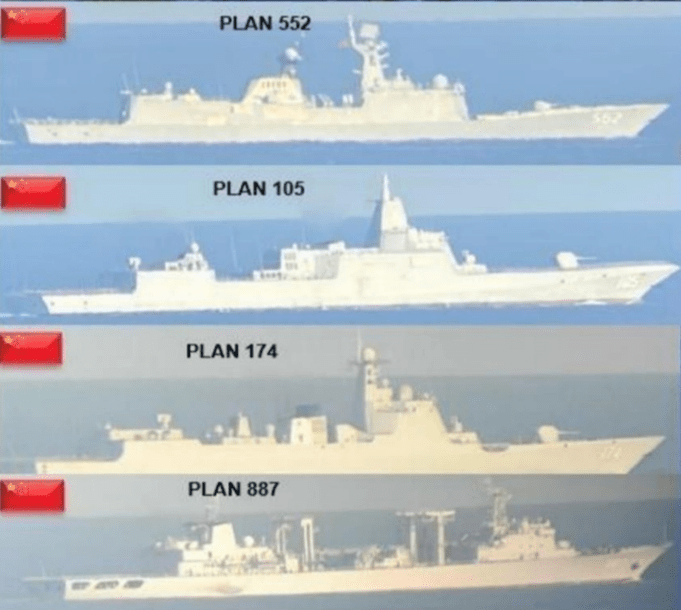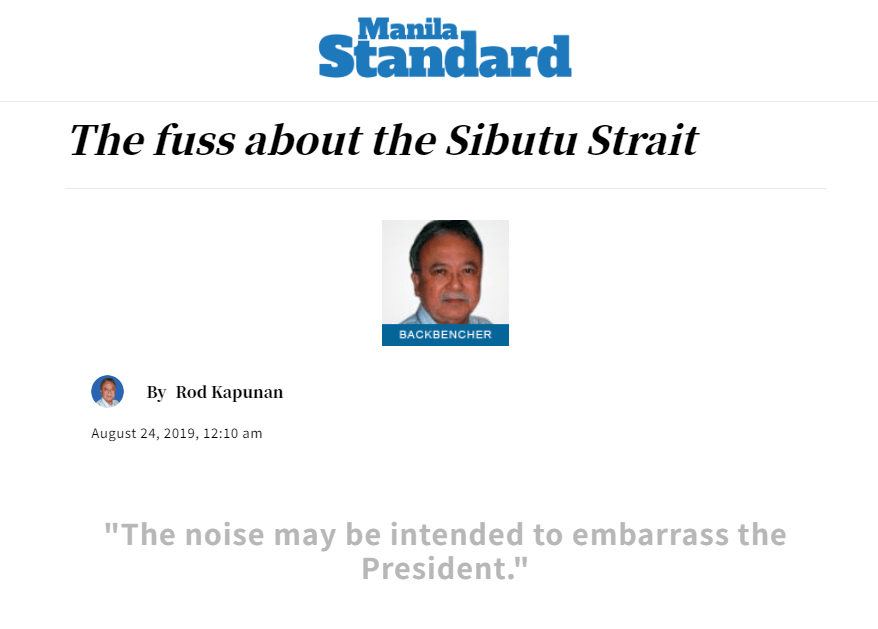Of Sibutu Strait, Calabaza Thinktank, Jurassic Diplomacy
Part Two of Three: Marcos Foreign Policy Reeks of Mental Gymnastics
When it comes to the United States’ assertion of freedom of navigation even in what China claims as its territorial waters in the South China Seas, Chester Cabalza, president and founder of Manila-based think tank International Development and Security Cooperation, remains servile even when it violates the principle of innocent passage of the United Nations Convention of the Law of the Sea of which it is not a member.
But even while the Philippine military deemed the presence of four Chinese warships in the Sibutu Strait as innocent passage, a self-proclaimed security “expert” insists that Beijing should have notified Manila because according to him, “Sibutu”, referring to the narrow channel that separates Sulu Archipelago and Borneo, remains part of the nation’s “internal waters”.
For the information of calabaza thinktanks, the Sibutu Strait is approximately 18 miles (16 nautical miles or 29 kilometers) wide and separates Borneo from the Sulu Archipelago. It has a deep sill that allows deep water to flow into the Sulu basin while connecting the Sulu Sea with the Sulawesi Sea. This passage was particularly drawn by the 1930 Convention Treaty between the United States and Britain before the Philippines was even declared a commonwealth.
By the widest stretch of my imagination, I cannot fathom why Cabalza’s medulla oblogata considers this “internal waters”.
The Sibutu Strait is international waters, and vessels passing through it enjoy the right of innocent passage. This means that ships can navigate through the strait without being subjected to interference or harassment, as long as they do not engage in any harmful activities.

Another “squash” booboo
This is the second Cabalza hoax that the Philippines Daily Inquirer propagated in less than a month.
Last April 17, as a native of Cagayan province which faces Taiwan, he spun the rumors that spread around the country saying “It seems that Chinese students in Cagayan universities and colleges are said to have been paying P2 million to obtain degrees.”
But instead of acting professionally to formalize a complaint with the necessary evidence against St. Paul University Philippines in Tuguegarao with the Commission on Higher Education, the “expert” sent his accusations to Inquirer.net by short-messaging-system (SMS).
The Philippines Daily Inquirer disclosed that the professor also texted “many of these students are not attending classes and that he suspects “the institutions that give college education or masters’ degrees to the students are being used as “milking cows.”
Despite 1766 words exalting Cabalza to the heavens in the website of the UP Department of Anthropology, the professor’s doctorate credibility has been demolished by first an error in geography about the Sibutu Strait, and second, his issuance of a public statement on basis rumor.
Two strikes of fake news, so why would I even believe that he has been a consultant of substance to the World Bank and the Japan International Cooperation Agency.
Legislating over international waters
On May 2, the People’s Liberation Army-Navy (PLAN) with bow numbers 552, 105, 174, and 887 traversed the Sibutu Strait.
When asked if China asked permission to pass the Sibutu Passage, Navy spokesperson Commander John Percie Alcos echoed the UNCLOS provision that “Foreign vessels can invoke the right to innocent passage through our territorial Seas for as long as their passage is not prejudicial to the peace, good order, or security of our country.”
Alcos explained “It is not unusual for foreign ships, commercial and military, from other flag states to pass through the Sibutu Passage.”
Cabalza, however, insisted on his disinformation that Beijing should have asked the consent of Manila before passing through. “Since these are warships, China must call the Philippine hotlines that they’re passing through our sea lanes.
“There must be a consent from the Philippine government on its end and to other relevant maritime agencies since these gray ships are passing through our internal waters and territory.”
Well, blow me down! An exert who does not know our geography over a maritime space between two seas carved by a treaty? How would that constitute internal waters and territory?
Cabalza said the latest development in Sibutu Passage shows the urgency of the passage of an Archipelagic Sea Lanes bill.
“Actually, Sibutu Passage is one of the sea lanes considered for the proposed Sea Lanes Act to legitimize the innocent passage of foreign ships passing through the internal waters and the exclusive economic zone of the Philippines,” Cabalza said.
Adding to the ludicrity, Inquirer.net invoked the recent passage by the House of Representatives recently passed House Bill No. 9034 or the proposed Act Establishing the Archipelagic Sea Lanes in Philippine Archipelagic Waters.
This bill provides that foreign ships and aircraft are allowed to pass through the designated sea lanes as quickly as possible for the sole purpose of “continuous, expeditious and unobstructed transit” while being directed to refrain from using any threat or force that will go against the “sovereignty, territorial integrity or political independence of the Republic of the Philippines.” However, its Senate version is still pending.
“Hopefully, the Philippine Congress will fast-track the approval and promulgation of this important domestic maritime law needed to operationalize the commercial access and innocent passage of our sea lanes to foreign and military vessels,” Cabalza said.
The security “expert” and Inquirer.net did not disclose, however, how Philippine legislation will apply to international waters.
Of dinosaur diplomats
Under normal circumstances being a former Philippine diplomat, courtesy dictates that I defer to a peer. But with all due respect, I would do damage to our foreign affairs if I do not correct Ambassador Jaime S. Bautista (ret.) who is the chairman of the Philippine Council for Foreign Relations and the president of the Philippine Ambassadors’ Foundation Inc.
When Bautista resonates fake news and reflects on fossilized arguments that do not help peace and stability in the region, he deserved to be exposed for misinformation, to say the least.
The retired ambassador said, “China’s aggression has been taking place in Ayungin Shoal, which is part of the Philippines’ exclusive economic zone (EEZ) and continental shelf. Before the arbitral award, China could claim rights to Ayungin Shoal in in good faith, but not anymore. The arbitral award is final and not subject to appeal.”
While we grant that the 2016 Arbitral Award on PCA Case Nº 2013-19 has confirmed that Ayungin is a low tide elevation within 200 nautical miles of our Palawan baselines, and it may be eligible to serve as our economic zone, there are three obstacles to this assumption.
If Bautista read the Award that he is citing, then he deliberately ignored Paragraph 1161 which declares that a “quintessentially military situation” dominates in the area nulling an economic zone, as militarization and EEZ are incompatible. Ironically, we defaulted our sovereign rights when President Joseph Estrada’s militarized Ayungin with the grounding of the BRP Sierra Madre on the shoal. Consequently, in Paragraph 1162, the Tribunal admitted that our “Submissions 14 a to c” complaining about Chinese activities there, are not within their jurisdiction.
Be that as it may, Bautista is in denial of the conflicting sovereignty claim of China regarding Ayuingin Shoal and almost the entirety of the South China Seas. Because it appears that he has bought into Paragraph 278 of the Arbitral Award (AA) which states – “…the maritime areas of the South China Sea encompassed by the relevant part of the ‘nine-dash line’ are contrary to the Convention and without lawful effect to the extent that they exceed the geographic and substantive limits of China’s maritime entitlements under the Convention.” (Italics mine).
My reason for my perception is that this is the only existing bar to the asymmetry between claims for China’s sovereignty and Philippine sovereign rights. Sovereign rights for an exclusive economic zone cannot overlap any other state’s sovereignty.
EEZ pertains only to entitlement for exploitation of resources under the water, without titles to ownership of what is surface of the water and the air over it. On the other hand, sovereignty denotes ownership of what is under the water, its surface and the air over it.
Note also that the Arbitral Award specifically dealt with only maritime entitlements under UNCLOS under the convention, after it said (China’s) ‘nine-dash line’ is contrary to the Convention.
The inherent defect of Philippine position, earlier dogmatically adopted by the Noynoy Aquino and now assumed by Bong Bong Marcos, is that it deceitfully regards UNCLOS as the be all and end all of legality on this issue. UNCLOS is just one of over 250,000 treaties and does not constitute to be the entirety of international law.
China does not even base its claim on the so-called “nine-dash line” but on historic rights.
What is totally dishonest with the Philippine position it that it deliberately ignores AA Paragraph 272: “In particular, the Tribunal emphasizes that nothing in this Award should be understood to comment in any way on China’s historic claim to the islands of the South China Sea. Nor does the Tribunal’s decision that a claim of historic rights to living and non-living resources is not compatible with the Convention limit China’s ability to claim maritime zones in accordance with the Convention, on the basis of such islands.”
Later in his article, Bautista affirms my position by contradicting himself, “The Philippines excluded the issue of sovereignty over Bajo de Masinloc in the UNCLOS arbitration because the UNCLOS tribunal (? sic) has no jurisdiction over this dispute. UNCLOS determines the rights of states to maritime zones of the world’s oceans and seas, but not over territorial disputes.”
Third and foremost. On the basis of customary international law, China is in possession of the territory and is effective control of at least its de facto sovereignty over the area.
More lies from Bautista, “China has also been committing aggression in Bajo de Masinloc (Scarborough Shoal), which China wrested from the Philippines by superior force, although no blood was spilled. Bajo de Masinloc is inside the Philippines’ EEZ.”
The same legalities and facts on the ground flows to Scarborough Shoal. It was the Philippines that militarized the area when in 2012 it sent a gray ship, BRP Gregorio del Pilar, to accost and board eight civilian fishing vessels bearing the PROC flag. It also grounded the BRP Benguet at Scarbough Shoal 3 years before that, but later on withdrew it.
The Philippines unilaterally withdrew its position during the Scarbough standoff, without force from China, after the late Albert del Rosario, our former foreign affairs secretary and his PH Ambassador to the US Jose Cuisia, botched negotiations with the US State Department. The details are in former Ambassador Rigoberto Tiglao’s book “Debacle”, and I am perplexed up to now why the Philippines did not directly negotiate with the Chinese Embassy in Manila except as a condition-reflex Filipino canine devotion to United States patronage.
Bautista continues his misinformation – “The Philippines acquired sovereignty over Bajo de Masinloc since Spanish times.” We did not have sovereignty under Spain as “Las Islas de Filipinas” and the US as “Philippine Islands” as we were a colony of both countries. Spain never occupied this specific SCS feature that is just outside its ancient shipping route.
The 1898 Treaty of Paris clearly shows that Bajo de Masinloc is outside its rectangular limits that were passed on by Spain to the Americans and to the Philippines when the Americans granted our independence. It was not included in the other territories passed on to us by the Treaty of Washington of 1900 amending limits set by 1898 Treaty of Paris, to wit: “Spain relinquishes to the United States all title and claim of title, which she may have had at the time of the conclusion of the Treaty of Peace of Paris, to any and all islands belonging to the Philippine Archipelago, lying outside the lines described in Article III of that Treaty and particularly to the islands of Cagayan, Sulu and Sibutu and their dependencies, and agrees that all such islands shall be comprehended in the cession of the Archipelago as fully as if they had been expressly included within those lines.”
The third treaty that demarcated our treaty limits was the earlier mentioned Convention Treaty of 1930 between the US and Britain which included Sibutu Islands on our side but excluded the Sibutu Strait, a matter that horribly confused security “expert” Chester Cabalza.
Bautista’s most ridiculous insertion is dropping BBC (British Broadcasting Corp.) line witnessing what he called “China’s latest aggression at Bajo de Masinloc and the Philippines demanding that Chinese vessels leave Bajo de Masinloc and its vicinity immediately.”
I think I have already debunked this absurdity – accusing China of aggression within its own territory as it exercises law enforcement as per AA Paragraph 809 mandate of regulation: “The Tribunal notes… traditional fishing rights are not absolute or impervious to regulation. Indeed, the careful regulation of traditional fishing may be necessary for conservation and to restrict environmentally harmful practices.
“Customary international law, in this respect, does not restrict the coastal State from reasonable regulation…Nor would it prevent the coastal State from assessing the scope of traditional fishing to determine, in good faith, the threshold of scale and technological development beyond which it would no longer accept that fishing by foreign nationals is traditional in nature.”
Asking China to abandon features of the South China Sea where it exercises sovereignty in at least Bajo de Masinloc (Scarborough Shoal) and 12 nautical miles of territorial sea around it, borders on Jurassic diplomacy.
Bautista should maximize his excess hours in retirement by reading and re-reading UNCLOS and the 2016 Arbitral Award on PCA Case Nº 2013-19. There are also many relevant treaties archived among more than 250,000 that can be enlightening when it comes to honing one’s mind on a complicated issue such as the South China Sea, and confirming China’s historic rights.
Filipino diplomats are poor in international relations because what they lack in history, they spend splitting hairs locked in law.
To be continued: Next, Sleeper cells?
READ ALSO – THE FUZZ ABOUT THE SIBUTU STRAIT.
https://manilastandard.net/?p=303142
Adolfo Quizon Paglinawan
is former diplomat who served as press attaché and spokesman of the Philippine Embassy in Washington DC and the Philippines’ Permanent Mission to the United Nations in New York from April 1986 to 1993. Presently, he is vice-president for international affairs of the Asian Century Philippines Institute, a geopolitical analyst, author of books, columnist, a print and broadcast journalist, and a hobby-organic-farmer.
His best sellers, A Problem for Every Solution (2015), a characterization of factors affecting Philippine-China relations, and No Vaccine for a Virus called Racism (2020) a survey of international news attempting to tracing its origins, earned for him an international laureate in the Awards for the Promotion of Philippine-China Understanding in 2021. His third book, The Poverty of Power is now available – a historiography of controversial issues of spanning 36 years leading to the Demise of the Edsa Revolution and the Forthcoming Rise of a Philippine Phoenix.
Today he is anchor for many YouTube Channels, namely Ang Maestro Lectures @Katipunan Channel (Saturdays), Unfinished Revolution (Sundays) and Opinyon Online (Wednesdays) with Ka Mentong Laurel, and Ipa-Rush Kay Paras with former Secretary Jacinto Paras (Tuesdays and Thursdays). His personal vlog is @AdoPaglinawan.
Email: contact@asiancenturyph.com
Facebook: https://www.facebook.com/asiancenturyph/
Twitter: https://twitter.com/AsianCenturyPH






